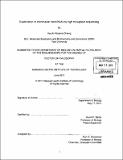Examination of mammalian microRNAs by high-throughput sequencing
Author(s)
Chiang, HyoJin Rosaria
DownloadFull printable version (29.10Mb)
Alternative title
Examination of mammalian miRNAs by high-throughput sequencing
Other Contributors
Massachusetts Institute of Technology. Dept. of Biology.
Advisor
David P. Bartel.
Terms of use
Metadata
Show full item recordAbstract
Small non-coding RNAs play an important role in a wide range of cellular events. MicroRNAs (miRNAs) are an abundant class of small RNAs that post-transcriptionally repress expression of their target genes. Since miRNA targeting is based on its sequence, accurate and comprehensive annotation of miRNA genes is fundamental to understanding miRNA gene regulation. Advances in high-throughput sequencing technology have led to discoveries of novel small RNA genes and identifications of their properties. We describe a method for construction of small-RNA library for Illumina sequencing platform that improves upon previous efforts. Sequencing data from small-RNA libraries constructed using this protocol can be used to profile small RNAs from a broad range of samples. In particular, we sequenced 60 million small RNAs from mouse brain, ovary, testes, embryonic stem cells, three embryonic stages, and whole newborns. The analysis of the data provide a substantially revised list of confidently identified murine miRNAs, thereby providing a more accurate picture of the general features of mammalian miRNAs and their abundance in the genome. In addition, our results revealed new aspects of miRNA biogenesis and modification, including tissue-specific strand preferences, sequential Dicer cleavage of a metazoan pre-miRNA, cases of consequential 5' heterogeneity, newly identified instances of miRNA editing, and widespread pre-miRNA uridylation reminiscent of Lin28-like miRNA regulation.
Description
Thesis (Ph. D.)--Massachusetts Institute of Technology, Dept. of Biology, 2011. Cataloged from PDF version of thesis. Includes bibliographical references.
Date issued
2011Department
Massachusetts Institute of Technology. Department of BiologyPublisher
Massachusetts Institute of Technology
Keywords
Biology.